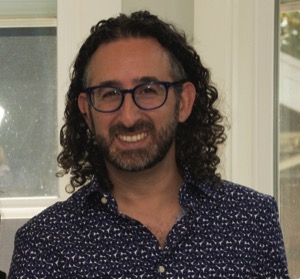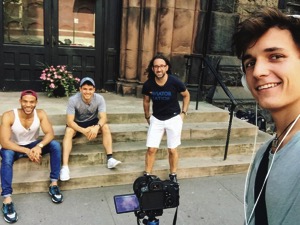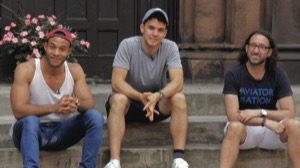
Filmmaker Jeff L. Lieberman on his latest movie which takes a stand against a Harlem anti-gay church while confronting the tightrope of gentrification, race and sexuality
PinkNews.com had it right when they wrote about My Harlem, “Filmmaker Jeff L. Lieberman is fighting back against the church in an amazing way, by making it the center of a gay love story.” The church Pink News is referring to is the ATLAH Church (All The Land Anointed Holy) in Harlem. In late July, 2014, the pastor of the congregation, Pastor James David Manning, was posting extreme, and very public, church doctrinaire on the bright neon sign outside. He routinely displayed messages from strains of this kind: “Churches & Members That Support Homos Cursed Be Thou With Cancer HIV Syphilis Stroke Madness Itch Then Hell 1 Cor. 6:9.” What, no ingrown toenails?
But because most sensible people see this for what it is, messages like these don’t get far these days. But they can have permanent damage while, during their short, cursed lives, they fester.
Jeff L. Lieberman understands damage. In The Amazing Nina Simone (2015) and Re-emerging: The Jews of Nigeria (2014), both of which have earned numerous recognitions and honors at film festivals worldwide, Lieberman documents the effects of prejudice and the lengths to which the discriminated-against go to silence their critics through personal fortitude, humility and purpose.
In My Harlem, while eschewing conventional right-side-of-the-tracks, wrong-side-of-the-tracks romantic narratives to tell a gay love story, he instead choses relationship-building, a coming together against a common enemy – in this case the ATLAH Church – that infuses the film with the same activist tendencies that have driven his two most popular non-fiction efforts to date.
His latest effort, while still in the final stages of crowdfunding, is a fictional account of two lovers, one black, one white, who confront bigotry and hatred with understanding and love in an era when the messenger has become the message.
I reached out to Jeff on Twitter and he graciously agreed to answer a few of my questions.
San Diego LGBT Weekly: Why did you choose to be a documentarian?

Jeff L. Lieberman: Your question is timely because I have just written my first feature-length narrative film titled My Harlem. It’s the first time I’ve dug into a narrative project, and I’m excited for the challenges in writing and directing this piece. As someone who loves watching and making documentaries, there are many elements in this project that center around actual events, locations and situations. But I have the freedom to explore them differently through the eyes of fictional people living, breathing and experiencing these situations. This film tackles gentrification, race, sexuality, police violence and activism and I think will be more powerful in the narrative form. But to answer your original question, I am someone with a large natural curiosity, who really loves delving into history, sociology, politics, culture, race, ancestry and demographics and film has been a natural way to discuss these topics in fascinating ways. I’m a journalist at heart and hope that my films invite people to consider situations in different ways and provoke them into action.
The choices you’ve made about the subjects you’ve covered speak to those who have been shunned, feared or ignored by society. What is it about that overarching theme that inspires you to make the work you do? Was it a product of your upbringing?
As mentioned, I am driven by a voracious curiosity. But, yes, I think my upbringing also factors into my desire to bring to light certain issues of injustice. Like many, my grandparents and great-grandparents were driven from their birth countries because of their religion, culture and ethnicity. They were divided from their families and became minorities in the New World. I grew up with a certain amount of privilege due to my skin color, but also with a strong sense of my Jewish roots – which cast me as minority in both my city and the larger world. Being gay also led to a further sense of being on the outside, a minority within a minority, and made me feel a connection to those you mention. Bringing forward stories of those who have also felt some sort of oppression is part of my effort to help repair the world.
My Harlem, your first feature fiction film, has undertaken a grassroots crowdfunding campaign. How is that going? Are you on track?
I always wish that fundraising is not part of the making of films, but it’s the reality of independent filmmaking. The crowdfunding has been going well, and we’ve had a lot of beautiful outreach, support and encouragement. The contributions made so far will certainly help cover some of the many costs of production and, more importantly, it will connect those supporters with the film for its entire trajectory. We have not gone “viral” or reached the masses, but we have carved a name for ourselves, brought some awareness of the issues we are tackling and will continue to fundraise through different means until we reach enough to get into production.
I want to bring up cultural appropriation. There was a dust-up recently about an author who suggested it was necessary to inhabit people and lives foreign to their own in order to tell a story and some were having none of it. That, for example, a white man could never possibly understand the black female experience. Does that even register on your radar? That a white man has given voice to a black singer, black African Jews and, now, to gay lovers? Personally? I think that’s your prerogative and I’m damn glad you’re doing it.
There is a delicate balance to doing this type of work and very little room for error. The wrong word can turn a project or lose an audience member, and I realize that I’m always treading on dangerous territory when exploring the stories of people outside my particular race. However, I also feel that I can be a vessel to use my privilege in positive ways, and to bring to light stories and issues that otherwise might not make it to the surface. In the instance of Nina Simone, I was dumbfounded that nobody had ever made a documentary film on her life and legacy. I was not sure if I was really the right person to be able to properly present her feelings, opinions and experience, but when I read the screenplay for the dramatized version of her life story (the Zoe Saldana project), I knew that I had to put those feelings temporarily aside and tell her true story. Time was of the essence and filmmakers of all colors had had 50 years of opportunities to share Nina’s amazing story in documentary form. My approach with that film and all my films is to rely on a variety of other people of all ages, races, genders, sexualities, backgrounds, etc. to help me shape the film and help me avoid the traps of stereotypes and clichés both in the writing and the visuals of the film.
What has been the reaction in the communities your documentaries take place? Did the level of support surprise you?

I have been really pleased by the reactions I have received to all my films. Screening The Amazing Nina Simone in front of a crowd of over 1,000 in a Harlem park last summer was perhaps the most nerve-wracking and joyous experience to date. Bringing the film home to Vancouver, where I grew up, and screening it at one of the premiere theaters in the city was also a beautiful moment of coming full circle.
What’s one question you’d hoped I’d ask you?
For your LGBT readers, I wanted to share that I wrote My Harlem because I am a gay man who hardly ever sees my life and dreams on film. I want to see a beautiful, romantic love story between two men that is based in reality with the challenges of dating and relationships but without the pitfalls of dramatic gay tragedy. Nobody in this film suffers in the closet, or dies of AIDS or spends their life in the dance club. And I say all that acknowledging that those stories are equally important, but also with the desire to say that our lives are more complex than that. I also wanted to delve into the stories of intelligent gay men who have thoughts and opinions on race, gentrification, police violence, politics and the issues facing our country. These are the stories of the men and women I know and through Nathan and Langston and their friends and families, we will see the diversity of appearance and thought, and the many ways they are also the same. Anybody interested in following the film’s development or contributing to our fundraising for some amazing perks can visit www.myharlemfilm.com. Your readers can watch or order our previous films at: www.amazingnina.com and www.re-emergingfilm.com











